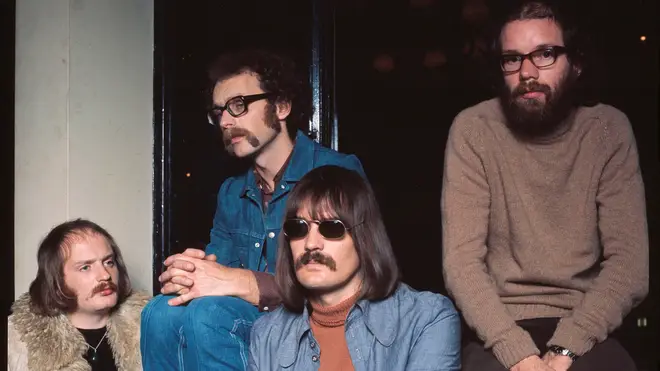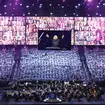‘Adiemus was a rush job’ – Sir Karl Jenkins reflects on his musical success at 80
16 February 2024, 18:59

Sir Karl Jenkins 80th birthday interview: ‘Adiemus was a rush job’ | Classic FM
The ‘Armed Man’ composer spoke to Classic FM’s John Humphrys about writing ‘Adiemus’ and being a ‘composer for peace’ – in a special interview for the musician’s 80th birthday.
Listen to this article
Sir Karl Jenkins is best known as the composer of beloved works including Adiemus, The Armed Man, and Palladio. For several years he held the title of most performed living composer, and in 2023 had his work performed at the coronation of His Majesty King Charles III.
Celebrating his 80th birthday in 2024, Sir Karl sat down with John Humphrys in an exclusive interview for Classic FM. He told John about his musical heritage, from his South Walian upbringing to joining jazz-rock band Soft Machine, and how he penned his great choral success, Adiemus.
Hailing from Penclawdd, South Wales, Jenkins grew up surrounded by classical music. His father taught music at the local school, and was also organist and choirmaster at the village chapel.
It was Jenkins’ father who gave the budding young musician his first piano lessons, and immersed him in a rich collection of classical music vinyls. “Usually the Germanic tradition,” Jenkins told Classic FM. “Austrian as well. From Bach through Mozart, Brahms onwards – Mahler, Wagner... this was my daily listening.”
Read more: Karl Jenkins’ best works: the Welsh composer’s most beautiful pieces of music

After graduating with a masters’ degree at the Royal Academy of Music, Jenkins joined prog-rock band Soft Machine in 1972, where he would meet the band’s founder Mike Ratledge.
After Ratledge left the band in 1976, the pair entered into a creative partnership called Jenkins Ratledge, which Jenkins says was “open to all offers musical.”
The duo began writing jingles for TV ads, from Levi’s jeans to De Beers diamonds. And in 1994, Jenkins was approached by US airline company, Delta, for a collaboration that would turn the composer into something of an overnight success.
“I wrote this song, this thing that became known as Adiemus,” Jenkins recalled. “It had some resonance globally – even to places like Japan, where Delta didn’t fly!”
To say that Adiemus had “some resonance” is an understatement. It climbed the charts in the UK and around Europe, and later sparked a record label signing and an entire series of albums by Jenkins.
Inspired by gospel, Celtic and African music, the choral masterpiece uses made-up words for a sensationally stirring chant.
In his conversation with John, Jenkins admits: “When I did the original Adiemus, it was a rush job. They wanted someone to sing, and so I thought – well, I haven’t got time to research text or anything.
“So I made it up, much like a scat singer sings in jazz. I kind of formulated text, invented phonetics really.”
Read more: What are the lyrics to Karl Jenkins’ ‘Adiemus’ – and what do they actually mean?
The words themselves may not have been designed with any meaning, but Jenkins said: “It did approximate as something like, ‘we will draw near’, which is a very appropriate name in a way.
“‘Adiemus’ means many things,” he added. “There was something spiritual about it. People said it was ‘spiritual music for secular people’ ... and in Japan it was known as healing music.”
The success of Adiemus became a launchpad for Jenkins’ career. In 1998 he was commissioned to write The Armed Man, as a ‘Mass for peace’ to celebrate the new millennium. Despite its ambition of “hoping for a better future”, as Jenkins says, the piece was written during the height of the Balkan war.
It was published in dedication to the victims in Kosovo, and Jenkins performed the work in the capital, Pristina, in 2015, to commemorate them.
“I became known as a composer of peace,” Jenkins commented, in reference to his 2011 work The Peacemakers, which set to music the words of some of history’s great figures, from Nelson Mandela to Mother Theresa.
Then, in 2016, Jenkins wrote ‘Cantata Memoria’, a moving piece in tribute to victims of the 1966 Aberfan Disaster – the most catastrophic mining disaster in British history.
Jenkins’ cantata remembered each of the 144 people killed in the disaster: “There’s one movement where the adult choirs chant the children’s names, and the children in the choirs chant the adults’ names.
“At the end of that, Bryn Terfel ends the movement with: ‘Buried alive by the National Coal Board,’ which is what they read out in the court case later.
“It was so extremely powerful, hugely evocative, and it’s vivid in our memory.”
Looking to the future, John asked Jenkins if he showed any signs of stopping. Jenkins responded: “It’s a bit of a hobby but, in a way it’s a bit of a drug really... It keeps me going, I suppose!”












